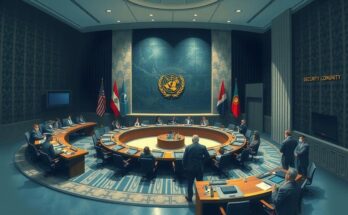U.S. President Joe Biden and Chinese President Xi Jinping will meet on November 16 during the APEC summit in Lima, Peru. They will discuss areas of cooperation, such as military communications, the fentanyl crisis, and AI risks. Biden will also express concerns over China’s support for Russia, trade policies, cyberattacks, and military actions. This meeting may precede a shift in U.S. posture under the incoming Trump administration.
U.S. President Joe Biden and Chinese President Xi Jinping are set to convene on November 16 during the APEC summit in Lima, Peru, as announced by the White House. This interaction mirrors their previous encounters, including last year’s discussions at the APEC summit in California and the 2022 meeting in Bali at the G20 summit. The leaders are expected to explore collaborative efforts, focusing on military communications resumption, strategies to combat the global fentanyl crisis, and preliminary engagements regarding the risks posed by Artificial Intelligence (AI). Furthermore, President Biden is likely to voice significant concerns regarding China’s support for Russia amid its ongoing war in Ukraine, particularly in light of North Korean troop deployments to bolster this support. The U.S. president is also anticipated to express his ongoing worries regarding what he perceives as China’s unfair trade practices, which adversely impact American workers. In addition, Biden is expected to address the issue of Chinese cyber-attacks affecting critical U.S. civilian infrastructure and China’s increasing military activities near Taiwan and in the South China Sea, while advocating for human rights considerations. This upcoming meeting may be the last opportunity for Biden and Xi to engage before the inauguration of Donald Trump in January, whose administration is predicted to adopt a more confrontational stance towards China. Trump’s recent appointments of noted China critics to significant foreign policy positions, such as Congressman Mike Waltz for national security adviser and Senator Marco Rubio for secretary of state, suggest a potential shift in the U.S.’s diplomatic approach. The situation necessitates the next administration’s careful navigation through the “tough, complicated relationship” that exists between the U.S. and China, particularly regarding issues involving Russia, Taiwan, the South China Sea, and cyber security challenges. Such areas will require thorough consideration, as they exhibit substantial policy divergences between the two countries. President Xi Jinping is likely to remain vigilant about the potential implications of the forthcoming U.S. trade policies under the Trump administration, especially concerning the possibility of implementing substantial tariffs on Chinese products.
The impending meeting between President Biden and President Xi marks a critical juncture in the U.S.-China relationship, emphasizing the ongoing challenges and collaborations necessary for both nations. Since their last encounter at the APEC summit in California, the geopolitical landscape has shifted, particularly with the tumultuous effects of the Russia-Ukraine conflict. The dynamic between the two leaders is underscored by their differing viewpoints on trade practices, human rights, and military engagements, necessitating dialogues that could shape future policies. As both countries grapple with global issues like the fentanyl crisis and the rise of AI technology, their discussions in Lima will be pivotal not only for bilateral relations but also for broader international stability.
The scheduled meeting between President Biden and President Xi provides a critical platform to address vital issues affecting U.S.-China relations. With concerns surrounding military communications, trade practices, Russia’s involvement in Ukraine, and cyber security on the agenda, both leaders face the challenge of navigating a complex and often contentious relationship. As the Trump administration approaches, the direction of U.S.-China relations may pivot towards a more confrontational stance. It is imperative that both administrations seek cooperative measures to manage their differences, ensuring the stability of bilateral and global relations.
Original Source: www.voanews.com




